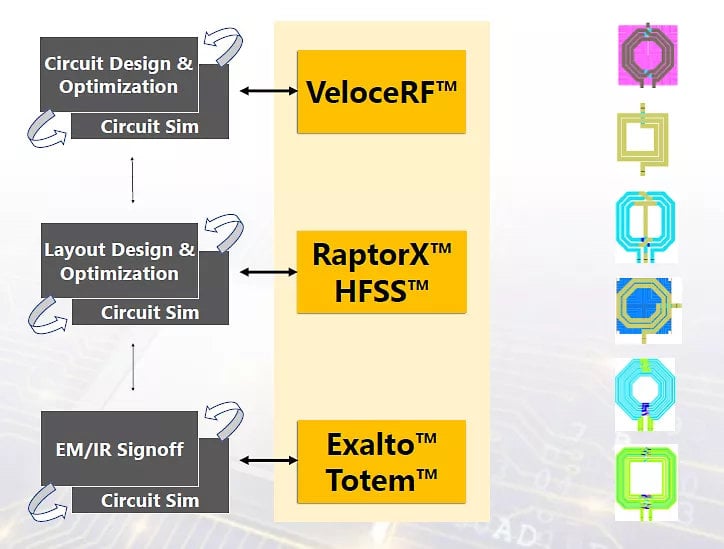Ansys and TSMC Collaborate to Deliver Multiphysics Design Methodology for Wireless Chips
Ansys platform supports TSMC’s N6RF Design Reference Flow to help enable faster and higher performance radio frequency chips for 5G, Wi-Fi, and IoT with TSMC’s N6RF process technology.

The TSMC N6RF Design Reference Flow uses the Ansys multiphysics simulation platform to provide a low-risk and proven solution for designing radio-frequency chips
- The Ansys multiphysics platform supports TSMC’s N6RF Design Reference Flow for designing radio frequency (RF) chips with TSMC N6 process technology
- Ansys solutions, including Ansys® RaptorX™, Ansys® Exalto™, Ansys® VeloceRF™, and Ansys® Totem™, are enabled throughout the TSMC N6RF Design Reference Flow from implementation to verification
Ansys collaborated with TSMC on the TSMC N6RF Design Reference Flow for TSMC’s N6 process technology. The Reference Flow uses the Ansys multiphysics simulation platform, including Ansys® RaptorX™, Ansys® Exalto™, Ansys® VeloceRF™, and Ansys® Totem™ to provide a low-risk and proven solution for designing radio-frequency chips.
The TSMC N6RF Design Reference Flow provides RF designers with a workflow that accelerates design times, reduces wasteful over-design. It enables higher performance and reliability for chips used in 5G radio communication, Wi-Fi connectivity, and IoT networks. Extending its support for advanced-node technologies, Ansys collaborated with TSMC to enhance both RaptorX and Ansys® HFSS™ to accept TSMC’s encrypted technology files.
“Wireless communication has become an integral part of many of today’s high-tech systems,” said Suk Lee, vice president of Design Infrastructure Management Division at TSMC. “We’re working closely with our ecosystem partners to address this growing demand with a verified RF Design Reference Flow based on our N6RF process technology and popular design tools that will help our mutual customers quickly launch their next generation silicon designs benefiting from the power and performance boosts of our advanced technologies.”
TSMC’s N6RF Design Reference Flow enables advanced design capabilities in the Ansys platform, including fast in-design analysis of electromagnetic coupling and the layout synthesis of coils, transmission lines, and other inductive circuit devices. It also supports circuit-under-inductor techniques that can significantly reduce the area and hence the cost of an RF design.
“Modern system design is increasing the scope of multiphysics effects that need to be considered to optimize power, performance, and area of almost every leading design project," said John Lee, vice president and general manager of the semiconductor, electronics, and optics business unit at Ansys. “Our collaboration with TSMC makes it easier for joint customers to adopt Ansys’ advanced platform of solutions for simulating and modeling electromagnetic interactions on integrated circuits manufactured by TSMC.”
www.ansys.com

